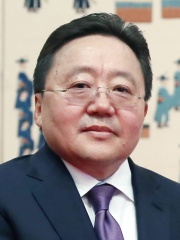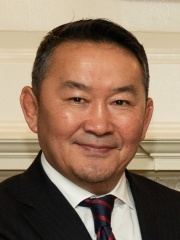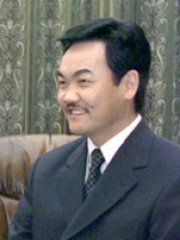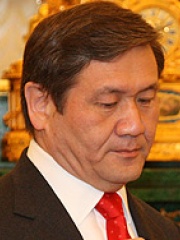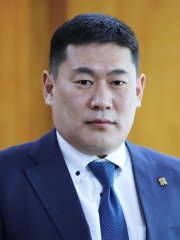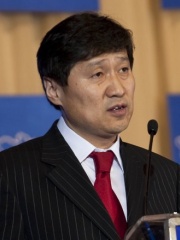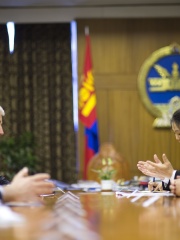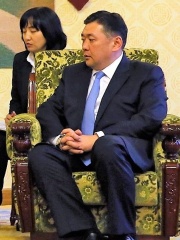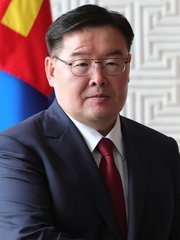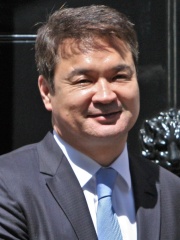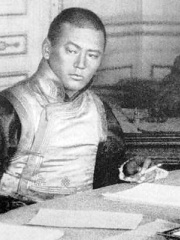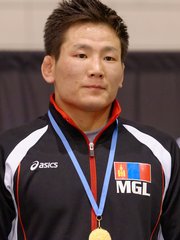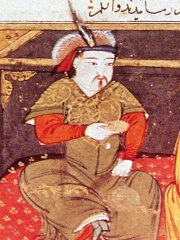
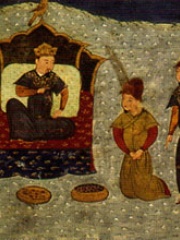
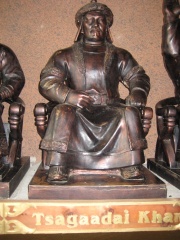
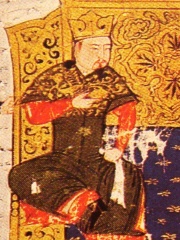
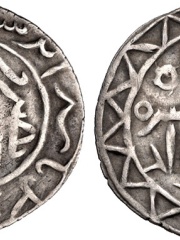
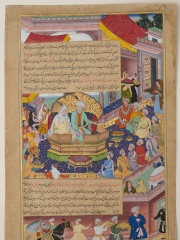
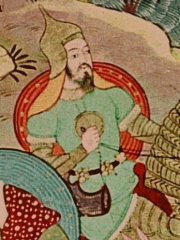
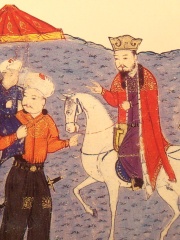
The Most Famous
POLITICIANS from Mongolia
This page contains a list of the greatest Mongolian Politicians. The pantheon dataset contains 19,576 Politicians, 43 of which were born in Mongolia. This makes Mongolia the birth place of the 73rd most number of Politicians behind Libya, and Paraguay.
Top 10
The following people are considered by Pantheon to be the top 10 most legendary Mongolian Politicians of all time. This list of famous Mongolian Politicians is sorted by HPI (Historical Popularity Index), a metric that aggregates information on a biography's online popularity. Visit the rankings page to view the entire list of Mongolian Politicians.

1. Hulagu Khan (1217 - 1265)
With an HPI of 84.69, Hulagu Khan is the most famous Mongolian Politician. His biography has been translated into 76 different languages on wikipedia.
Hulegu Khan, also known as Hülegü or Hulagu (c. 1217 – 8 February 1265), was a Mongol ruler who conquered much of Western Asia. As a son of Tolui and the Keraite princess Sorghaghtani Beki, he was a grandson of Genghis Khan and brother of Ariq Böke, Möngke Khan, and Kublai Khan. Hulegu's army greatly expanded the southwestern portion of the Mongol Empire, founding the Ilkhanate in Persia. Under Hulegu's leadership, the Mongols sacked and destroyed Baghdad, ending the Islamic Golden Age and the Abbasid dynasty. They also weakened Damascus, causing a shift of Islamic influence to the Mamluk Sultanate in Cairo.

2. Batu Khan (1207 - 1255)
With an HPI of 81.22, Batu Khan is the 2nd most famous Mongolian Politician. His biography has been translated into 75 different languages.
Batu Khan (c. 1205–1255) was a Mongol ruler and founder of the Golden Horde, a constituent of the Mongol Empire established after Genghis Khan's demise. Batu was a son of Jochi, thus a grandson of Genghis Khan. His ulus ruled over the Kievan Rus', Volga Bulgaria, Cumania, and the Caucasus for around 250 years.

3. Chagatai Khan (1183 - 1242)
With an HPI of 79.21, Chagatai Khan is the 3rd most famous Mongolian Politician. His biography has been translated into 64 different languages.
Chagatai Khan (Mongolian: ᠴᠠᠭᠠᠲᠠᠶ; c. 1184 – 1242) was a son of Genghis Khan, a prominent figure in the early Mongol Empire, and the first khan of the Chagatai Khanate. The second son of Genghis's wife Börte, Chagatai was renowned for his masterful knowledge of Mongol custom and law, which he scrupulously obeyed, and his harsh temperament. Because Genghis felt that he was too inflexible in character, most notably never accepting the legitimacy of his elder brother Jochi, he excluded Chagatai from succession to the Mongol throne. He was nevertheless a key figure in ensuring the stability of the empire after Genghis's death and during the reign of his younger brother Ögedei Khan. Chagatai held military commands alongside his brothers during the Mongol conquest of the Jin dynasty in 1211 and the invasion of the Khwarazmian Empire in 1219. During the latter, he was appointed to a key role in organising logistics in addition to battlefield responsibilities, but was censured after feuding with Jochi during the Siege of Gurganj. After the campaign, Chagatai was granted large tracts of conquered land in Central Asia, which he ruled until his death. He quarrelled with civil officials such as Mahmud Yalavach over matters of jurisdiction and advised Ögedei on questions of rulership. Chagatai died shortly after Ögedei in 1242; his descendants ruled his territories as the eponymous Chagatai Khanate.

4. Tolui (1191 - 1232)
With an HPI of 79.05, Tolui is the 4th most famous Mongolian Politician. His biography has been translated into 53 different languages.
Tolui (c. 1191 – 1232) was the youngest son of Genghis Khan and Börte. A prominent general during the early Mongol conquests, Tolui was a leading candidate to succeed his father after his death in 1227 and ultimately served as regent of the Mongol Empire until the accession of his brother Ögedei two years later. Tolui's wife was Sorghaghtani Beki; their sons included Möngke and Kublai, the fourth and fifth khans of the empire, and Hulagu, the founder of the Ilkhanate. Tolui was less active than his elder brothers Jochi, Chagatai, and Ögedei during their father's rise to power, but once he reached adulthood he was considered the finest warrior of the four. He commanded armies under his father during the first invasion of Jin China (1211–1215), and his distinguished service during the Mongol invasion of the Khwarazmian Empire secured his reputation. After the fall of the cities of Transoxiana in 1220, Genghis dispatched Tolui early the following year to subjugate the region of Khorasan, which had begun to cause trouble for the Mongol armies. Tolui executed his orders with ruthless efficiency, assaulting the major cities of Merv, Nishapur, and Herat, and subjugating numerous others. Medieval chroniclers attributed more than three million deaths to the massacres he ordered at Nishapur and Merv; while these figures are considered exaggerated by modern historians, they are evidence of the abnormal brutality of Tolui's campaign. As the Mongols' traditional inheritance system was a form of ultimogeniture, Tolui was always a leading candidate to succeed his father. His position was strengthened by the elimination of Jochi and Chagatai, on account of possible illegitimacy and excessive arrogance respectively. Genghis eventually passed Tolui over in favour of Ögedei, who was known for his generosity. Tolui was on his father's last campaign when the latter died in mid-1227; as the youngest son, he became regent, in charge of his father's burial and the administration of the nation. It is possible that the two-year interregnum was lengthened by Tolui's desire to become khan himself; he nevertheless eventually swore allegiance to Ögedei, who was crowned in 1229. Tolui accompanied Ögedei after the resumption of warfare against the Jin dynasty in 1230. The campaign was successful and they returned home to Mongolia two years later. Tolui died in unclear circumstances in late 1232. The official record was that he died during a shamanic ritual while saving Ögedei from a curse; alternative theories suggest that he died from alcoholism or that Ögedei had him poisoned. Having taken over Tolui's lands and estates after his death, Sorghaghtani amassed enough wealth and supporters to ensure that her son Möngke took power in 1251, after the death of Ögedei's son Güyük.
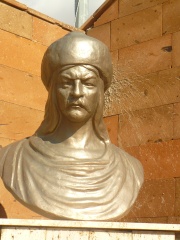
5. Modu Chanyu (234 BC - 174 BC)
With an HPI of 75.23, Modu Chanyu is the 5th most famous Mongolian Politician. Her biography has been translated into 40 different languages.
Modu (c. 234–174 BCE) was the son of Touman and the founder of the empire of the Xiongnu. He came to power by ordering his men to kill his father in 209 BCE. Modu ruled from 209 to 174 BCE. He was a military leader under his father Touman and later chanyu of the Xiongnu Empire, based on the Mongolian Plateau. He secured the throne and established a powerful Xiongnu Empire by successfully unifying the tribes of the Mongolian–Manchurian grassland in response to the loss of Xiongnu pasture lands to invading Qin forces commanded by Meng Tian in 215 BCE. While Modu rode and then furthered the wave of militarization and effectively centralized Xiongnu power, the Qin quickly fell into disarray with the death of the first emperor in 210 BCE, leaving Modu a free hand to expand his empire into one of the largest of his time. The eastern border stretched as far as the Liao River, the western borders of the empire reached the Pamir Mountains, whilst the northern border reached Lake Baikal. Modu's raids into China resulted in the dynasty agreeing to pay an annual tribute alongside other goods such as silk, grain and rice. Modu was succeeded by his son Laoshang.

6. Berke (1209 - 1266)
With an HPI of 75.07, Berke is the 6th most famous Mongolian Politician. His biography has been translated into 44 different languages.
Berke Khan (died 1266/1267; also Birkai; Turki/Kypchak: برکه خان, Mongolian: Бэрх хан, Tatar: Бәркә хан) was a Mongol military commander and the ruler of the Golden Horde, a division of the Mongol Empire, who effectively consolidated the power of the Blue Horde and White Horde from 1257 to 1266. He was a grandson of Genghis Khan from his son Jochi. He succeeded his brother Batu Khan of the Blue Horde (West), and was responsible for the first official establishment of Islam in a khanate of the Mongol Empire. Following the Sack of Baghdad by Hulagu Khan, his cousin and head of the Mongol Ilkhanate based in Persia, he allied with the Egyptian Mamluks against Hulagu. Berke also supported Ariq Böke against Kublai in the Toluid Civil War, but did not intervene militarily in the war because he was occupied in his own war against Hulagu and the Ilkhanate.

7. Börte (1161 - 1230)
With an HPI of 74.50, Börte is the 7th most famous Mongolian Politician. Her biography has been translated into 44 different languages.
Börte Üjin (; Mongolian: ᠪᠥᠷᠲᠡ ᠦᠵᠢᠨ Бөртэ үжин), better known as Börte (c. 1161–1230), was the first wife of Temüjin, who became Genghis Khan, the founder of the Mongol Empire. Börte became the head of the first Court of Genghis Khan, and Grand Empress of his Empire. She was betrothed to Genghis at a young age, married at seventeen, and then kidnapped by a rival tribe. Her husband's rescue of her is considered one of the key events that started him on his path to becoming a conqueror. She gave birth to four sons and five daughters, who, along with their own descendants, were the primary bloodline in the expansion of the Mongol Empire.

8. Ariq Böke (1219 - 1266)
With an HPI of 73.98, Ariq Böke is the 8th most famous Mongolian Politician. His biography has been translated into 38 different languages.
Ariq Böke (after 1219–1266) was the seventh and youngest son of Tolui and a grandson of Genghis Khan. After the death of his brother the Great Khan Möngke, Ariq Böke claimed the title of the Great Khan of the Mongol Empire and briefly took power while his brothers Kublai and Hulagu were absent from the Mongolian Plateau. When Kublai returned for an election in 1260, rival factions could not agree, and elected both claimants, Kublai and Ariq Böke, to the throne, resulting in the Toluid Civil War that fragmented the Mongol Empire. Ariq Böke was supported by the traditionalists of the Mongol Empire, while his brother Kublai was supported by the senior princes of North China and Manchuria.

9. Abaqa Khan (1234 - 1282)
With an HPI of 73.66, Abaqa Khan is the 9th most famous Mongolian Politician. His biography has been translated into 37 different languages.
Abaqa Khan (27 February 1234 – 4 April 1282, Mongolian: Абаха/Абага хан (Khalkha Cyrillic), ᠠᠪᠠᠭᠠᠬᠠᠨ (Traditional script), "paternal uncle", also transliterated Abaġa), was the second Mongol ruler (Ilkhan) of the Ilkhanate. The son of Hulagu Khan and Lady Yesünčin and the grandson of Tolui, he reigned from 1265 to 1282 and was succeeded by his brother Ahmed Tekuder. Much of Abaqa's reign was consumed with civil wars in the Mongol Empire, such as those between the Ilkhanate and the northern khanate of the Golden Horde, and the Chagatai Khanate in Central Asia. Abaqa also engaged in unsuccessful attempts at invading Syria under the Mamluk Sultanate, which included the Second Battle of Homs.
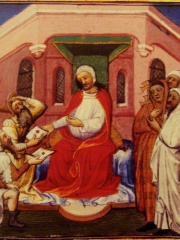
10. Toghrul (1130 - 1203)
With an HPI of 72.19, Toghrul is the 10th most famous Mongolian Politician. His biography has been translated into 29 different languages.
Toghrul (Mongolian: Тоорил хан Tooril han; Chinese: 脫里), also known as Wang Khan or Ong Khan (Ван хан Wan han; Chinese: 王汗; pinyin: Wáng Hán; died 1203), was a khan of the Keraites. He was the blood brother (anda) of the Mongol chief Yesugei and served as an important early patron and ally to Yesugei's son Temüjin, later known as Genghis Khan. The main source on his life is the Secret History of the Mongols.
People
Pantheon has 43 people classified as Mongolian politicians born between 234 BC and 1986. Of these 43, 15 (34.88%) of them are still alive today. The most famous living Mongolian politicians include Ukhnaagiin Khürelsükh, Tsakhiagiin Elbegdorj, and Khaltmaagiin Battulga. The most famous deceased Mongolian politicians include Hulagu Khan, Batu Khan, and Chagatai Khan. As of April 2024, 2 new Mongolian politicians have been added to Pantheon including Gombojavyn Zandanshatar, and Ganzorigiin Mandakhnaran.
Living Mongolian Politicians
Go to all RankingsUkhnaagiin Khürelsükh
1968 - Present
HPI: 67.12
Tsakhiagiin Elbegdorj
1963 - Present
HPI: 67.08
Khaltmaagiin Battulga
1963 - Present
HPI: 63.87
Natsagiin Bagabandi
1950 - Present
HPI: 62.91
Nambaryn Enkhbayar
1958 - Present
HPI: 62.48
Luvsannamsrain Oyun-Erdene
1980 - Present
HPI: 59.06
Sükhbaataryn Batbold
1963 - Present
HPI: 53.03
Norovyn Altankhuyag
1958 - Present
HPI: 52.42
Sanjaagiin Bayar
1956 - Present
HPI: 52.08
Miyeegombyn Enkhbold
1964 - Present
HPI: 52.07
Gombojavyn Zandanshatar
1970 - Present
HPI: 51.49
Chimediin Saikhanbileg
1969 - Present
HPI: 50.32
Deceased Mongolian Politicians
Go to all RankingsHulagu Khan
1217 - 1265
HPI: 84.69
Batu Khan
1207 - 1255
HPI: 81.22
Chagatai Khan
1183 - 1242
HPI: 79.21
Tolui
1191 - 1232
HPI: 79.05
Modu Chanyu
234 BC - 174 BC
HPI: 75.23
Berke
1209 - 1266
HPI: 75.07
Börte
1161 - 1230
HPI: 74.50
Ariq Böke
1219 - 1266
HPI: 73.98
Abaqa Khan
1234 - 1282
HPI: 73.66
Toghrul
1130 - 1203
HPI: 72.19
Jebe
1137 - 1225
HPI: 71.90
Damdin Sükhbaatar
1893 - 1923
HPI: 70.61
Newly Added Mongolian Politicians (2025)
Go to all RankingsOverlapping Lives
Which Politicians were alive at the same time? This visualization shows the lifespans of the 7 most globally memorable Politicians since 1700.


